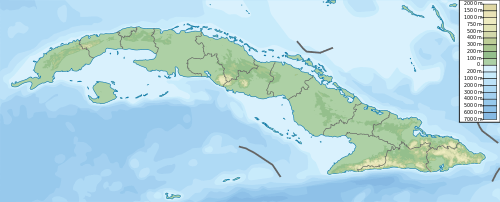Habana Formation
The Habana Formation is a geologic formation in Cuba. It preserves mainly gastropod and rudist fossils dating back to the Late Campanian to Maastrichtian periods.[1] The formation was defined by Robert H. Palmer in 1934.[2]
| Habana Formation Stratigraphic range: Late Campanian-Maastrichtian ~72–66 Ma | |
|---|---|
| Type | Formation |
| Sub-units | Titanosarcolites Beds |
| Lithology | |
| Primary | Limestone |
| Location | |
| Coordinates | 22.2°N 79.8°W |
| Approximate paleocoordinates | 21.2°N 63.6°W |
| Region | Pinar del Río & Sancti Spíritus Provinces |
| Country | |
| Type section | |
| Named for | La Habana |
| Named by | Robert H. Palmer |
| Year defined | 1934 |
 Habana Formation (Cuba) | |
See also
- List of fossiliferous stratigraphic units in Cuba
References
- Habana Formation at Fossilworks.org
- Bermúdez, 1964, p.29
Bibliography
- Pedro J Bermúdez (1964), Adiciones a las formaciones geológicas de Cuba (PDF), Instituto Cubano de Recursos Minerales, pp. 20–39, retrieved 2019-02-07
Further reading
- Pedro J Bermúdez (1961), "Las formaciones geológicas de Cuba" (PDF), Geología Cubana, 1: 1–180, retrieved 2019-02-06
- N. F. Sohl and H. A. Kollmann. 1985. Cretaceous Actaeonellid Gastropods from the Western Hemisphere. United States Geological Survey Professional Paper 1304:1-104
- A. Torre. 1960. Notas sobre rudistas [Notes about rudists]. Memorias de la Sociedad Cubana de Historia Natural 25(1):51-64
This article is issued from Wikipedia. The text is licensed under Creative Commons - Attribution - Sharealike. Additional terms may apply for the media files.